The Price Before Christmas: Costs of holiday decorations head north
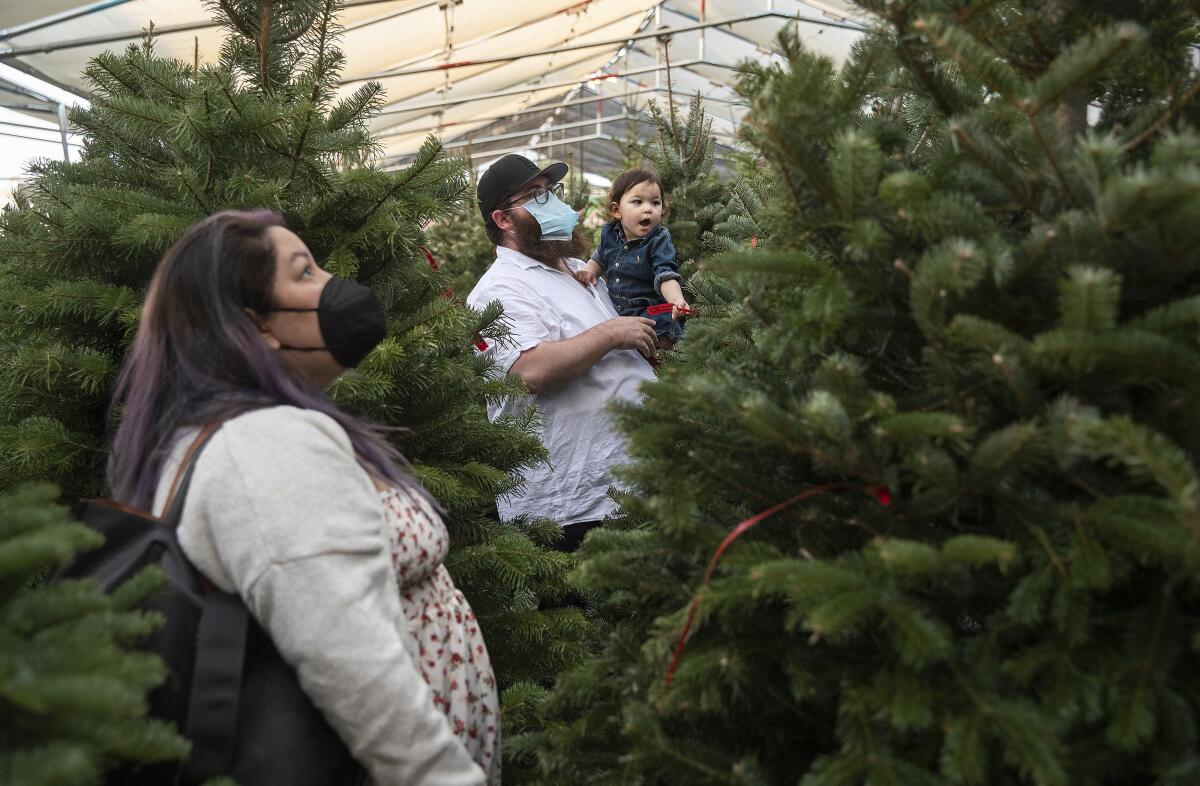
- Share via
It was late Thursday morning and Aldik Home was bustling with dozens of shoppers perusing the showroom decked out with thousands of Christmas lights and dozens of trees hung with all manner of ornaments and ribbons.
The six-decade-old Van Nuys retailer’s Christmas displays have gained some notoriety in the past, with the Kardashian family filming a holiday episode of its reality TV show inside. (In a tense exchange at the store, Kim accused Kris of attempting to copy her Christmas decorations purchased at Aldik.)
But this year, Aldik customers will have to open their wallets wider to purchase a 7.5-foot-tall Deluxe Flocked Arctic tree or a 32-foot strand of Cool White LED lights.
Prices for some items have increased by as much as 25%, as the retailer has run into a mix of supply chain issues, said store owner Larry Gold. The store has faced increased shipping and import costs, with rates jumping as high as 600% and months-long delays stemming from ongoing issues at the Port of Los Angeles.
Prices at Aldik are 10% higher on average over last year’s, Gold said.
The issues have rocked nearly every industry in the country, with price increases and delays on everything from toys and video game consoles to clothing and extension cords.
And the price increases are not just hitting decorations and artificial trees: A variety of factors including fires and extreme heat have upped the prices on domestically produced natural trees as well.
Gold’s customers, however, don’t seem to mind, at least not yet, with the parking lot full and Gold expecting a busy first weekend of December.
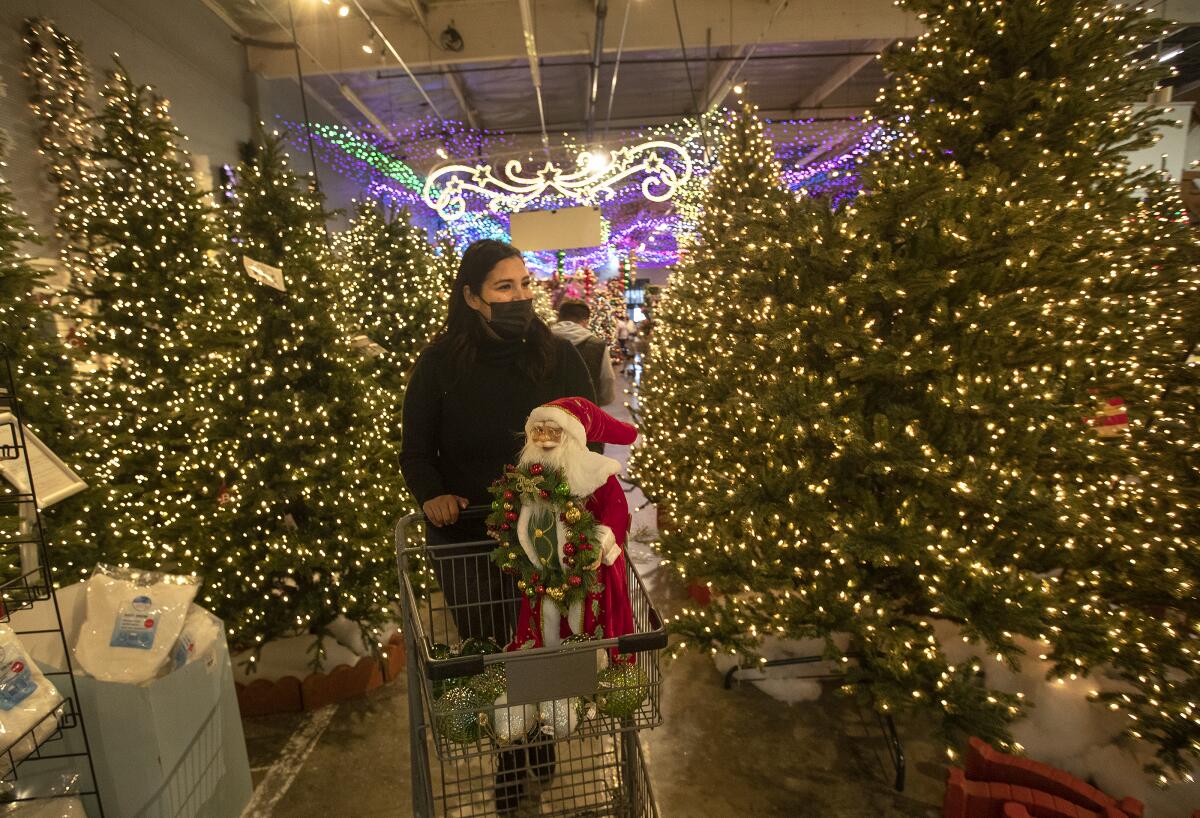
Dressed in a button-down shirt and a mask, Gold oversaw his sales floor Thursday morning. As busy as it seemed Thursday, the weekend could bring lines out the door, he said.
But as good as business was, managing the supply chain issues has become the nightmare before Christmas.
“I’ve never seen disruptions like this,” said Gold, who has run Aldik for over 30 years. His father, Richard Gold, started the shop as Aldik Artificial Flowers in 1951. When not dressed up as a winter wonderland, the store specializes in artificial plants and flowers and home decor.
But the store’s holiday issues are exemplified by the ongoing saga of its artificial Christmas trees.
Aldik imports about 2,000 trees from China, transporting them in 10, 40-foot shipping containers. Usually, the store books the containers during summer, at around $3,000 each. The store begins its Christmas preparations, building out displays and setting out merchandise, months before the holiday season kicks off.
This year, Gold said, it took six weeks to book the shipping containers at a price of $18,000 apiece.
“Not only was it six weeks to try and get them booked, they all got on different ships and when they got here, the harbor was crowded so the ships had to sit out in the water for a couple of weeks,” Gold said. “When they finally got in, the harbor was a mess and containers got put in restricted areas.”
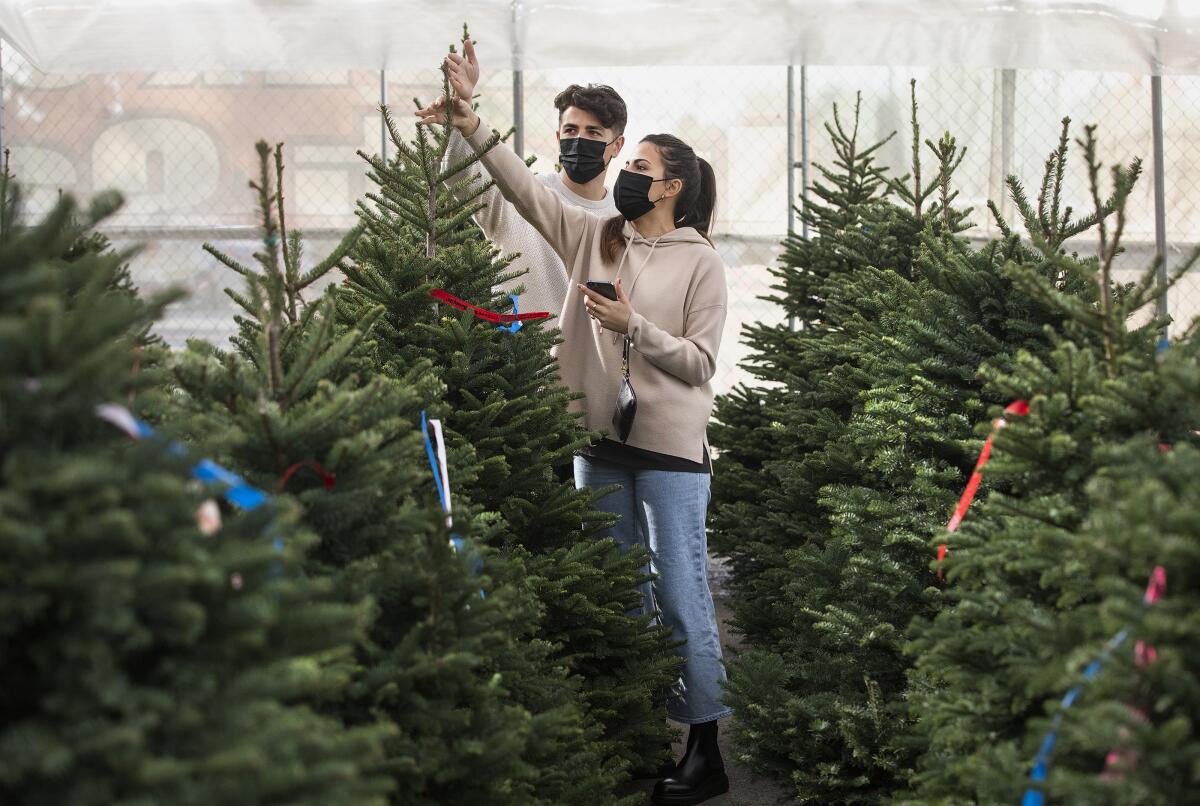
“We have two containers still that we have not received,” he said Wednesday, adding that one was put in a restricted area of the harbor on Monday.
“I don’t know when I’m getting that one,” he said.
Gold has increased the prices of his Christmas trees by 10% to 12%, although that has done little to dampen demand for trees that can go for as much as $1,850; most of the trees that do get delivered to the store are spoken for by the time they get off the truck.
Trisha Williams, of Burbank, examined one of Aldik’s trees Thursday morning, thoughtfully turning over the tag in her hand and touching the branches. She was trying to decide between investing in an artificial tree or buying a real one.
Williams was accompanied by her sister, Kesha Williams, and Kesha’s 3-year-old daughter Marie, who was dressed for the season with a mask featuring Elsa from Disney’s “Frozen.”
Artificial trees “do last forever,” Tricia noted.
Williams said she felt a sense of urgency to make a decision within the next few days but wasn’t concerned with low inventory so much as high prices.
“I haven’t noticed shortages in Christmas trees, but I have noticed that the prices are higher,” she said.
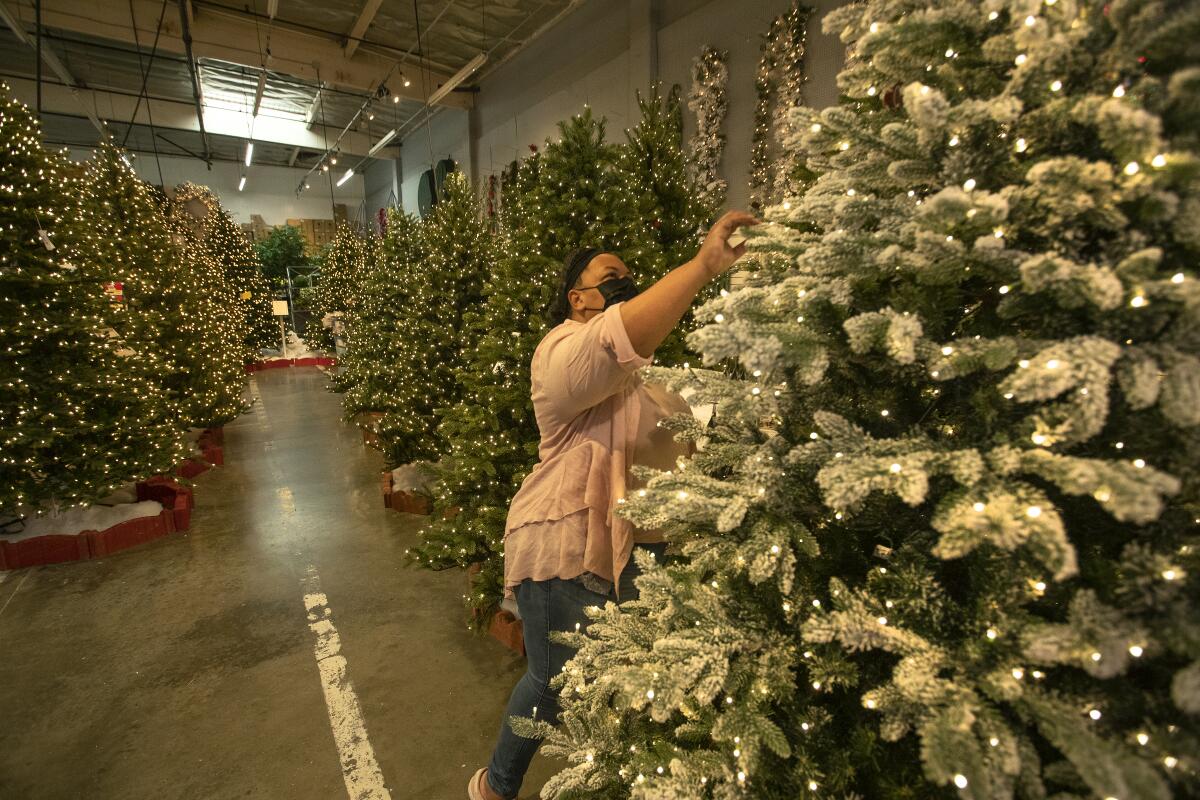
For Williams’ family, including her mom and sister, Christmas decorations, and Christmas trees specifically, are important.
“It’s very important to have it done beautifully and done how we’d like to have it done,” she said.
“Don’t touch my Christmas tree,” Kesha said.
But that commitment to a handcrafted tree can add up.
“It’s getting kind of pricey this year,” Trisha said.
“Demand is great and sales are up,” Gold said. “There’s pent-up demand because they couldn’t do anything (last year.)”
“The challenge is getting stuff out on the floor.”
A few miles away, in a parking lot at Los Angeles Valley College, hundreds of real trees stood under tarps at the Santa & Sons Christmas Tree lot, ready to be tied to the roofs of cars or tossed into the backs of pickups or even delivered.
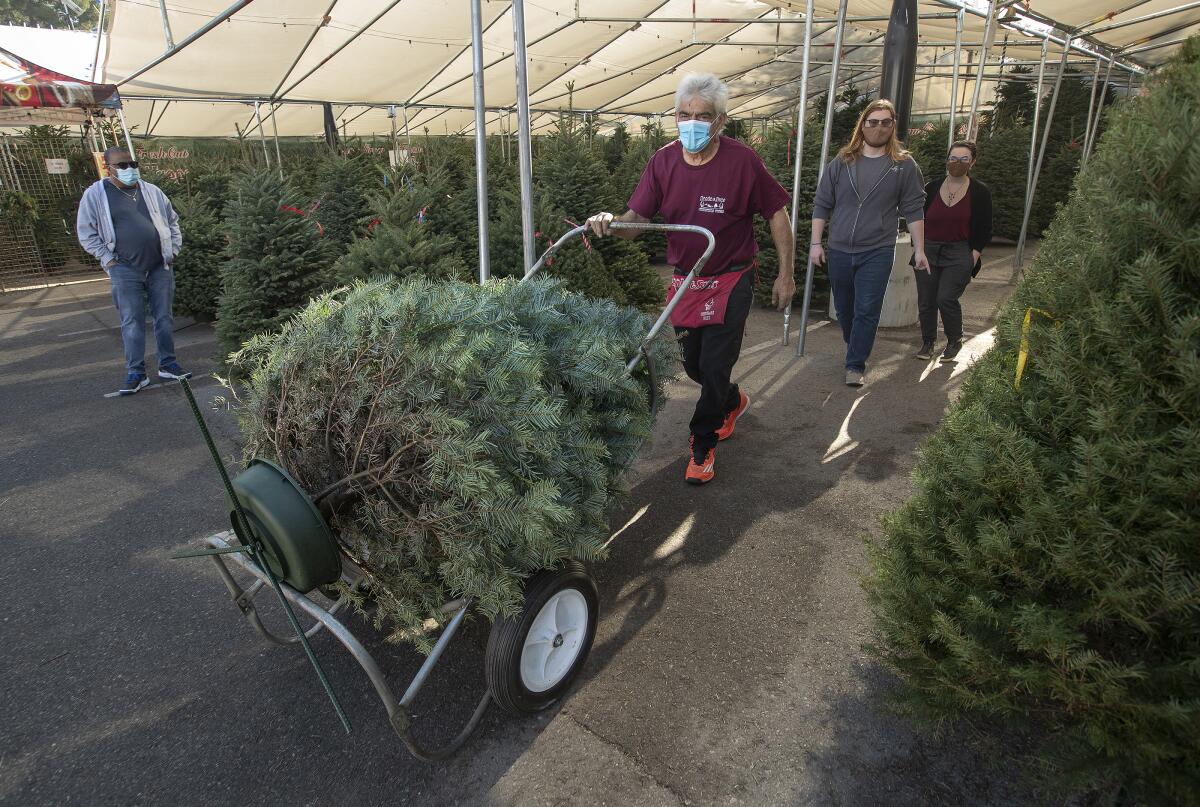
Los Angeles residents Stephen Clark and Melissa Enright shopped the lot Thursday morning for a tree for their apartment. A few years ago, the New York state transplants were living in a studio apartment with little room for a tree.
They discovered the Santa & Sons lot in 2017 when they bought a wreath. Now in an apartment with a little more space, Clark and Enright have opted for the tree.
The pair were hoping to get their tree early — not out of fear that inventory would run out, although Clark had heard news reports of shortages, but simply to enjoy it longer.
“Usually we forget, then it’s mid-December and it’s only up for 15 days so we keep it up until February,” Enright said.
“If they ran out it would be a shame, but it’s not the end of the world. A Christmas tree doesn’t make or break the holiday season, but it is nice to have,” Clark said.
Lot owner and tree grower Mark Rohlfs said he expects to sell most of his inventory even after increasing prices by 5% to 10% due to inflation and an increase in labor costs. Rohlfs said he increased wages for his staff by around 20%.
Rohlfs’ business is vertically integrated: He farms his trees in Oregon, then harvests them specifically for his lot in Los Angeles, which has insulated him from many of the supply-chain concerns that his big box and non-grower competitors may be facing this season, despite the fact that his crop is still recovering from fires and extreme heat in the Pacific Northwest this summer.
“In a normal situation, there’s some surplus that gets generated when you’re farming,” he said, explaining that the surplus would be wholesaled to other retailers. “That’s sort of vanished with the (2020 Holiday Farm Fire) and then the heatwave this year damaged about half the crop.”
But even the trees and seedlings damaged in this summer’s heatwave, which brought temperatures to highs of 117 degrees to Oregon in July, are expected to recover within a year.
“I liken it to getting a bad sunburn at the beach. You’ll be fine but you’ll be ugly for a while,” Rohlfs said.
The trees “are tough, they’re resilient. They can endure these kinds of things.”
More to Read
Sign up for Essential California
The most important California stories and recommendations in your inbox every morning.
You may occasionally receive promotional content from the Los Angeles Times.











